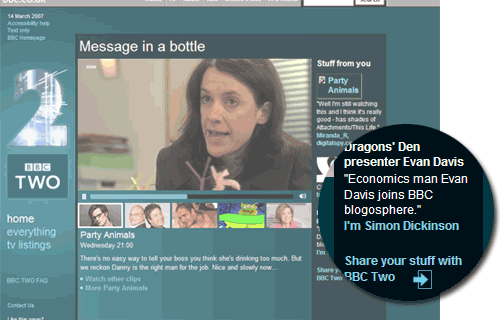I started writing this blog for a number of reasons. Shameless self-promotion, sure, but also to get some hands-on experience of the whole blogging phenomenon. I never doubted it had something, but I’m a firm believer in getting your hands dirty before pronouncing. Well, I’ve now passed the 500 posts mark on this here WordPress blog, and it’s time to look back on the lessons learned.
(The controversial one is at the bottom.)
It’s a very pure form of communication.
Through this blog, and the various connections it makes, I’ve struck up pretty good relationships with a bunch of people I’ve never met, and probably never will. And yet I feel as if I ‘know’ them really well. It would take quite some cynic to bash out insincere material on a daily basis. And it’s a great way to get ‘free consultancy’ from some of the smartest minds in the business.
It’s addictive.
Once you start, and let it become part of your routine, it’s hard to stop. You develop an ultimately ridiculous sense of responsibility to your audience (that’s you, dear reader). You start seeing things in print or on telly, and think ‘I really must blog that.’ And then you actually do. So it’s not a question of finding the time to do it; pretty quickly, it becomes more difficult not to do it.
Statistics are dodgier than most, but still compelling.
WordPress.com happily churns out a figure for the number of readers I get each day, in terms of web visitors and RSS subscribers, plus details of most popular individual posts etc. Of course, being web stats, it all has to be taken with a pinch of salt. Several times I’ve seen inexplicable spikes in traffic, particularly on the RSS feed; with so many people using just two services (Google Reader and Bloglines), you’re very vulnerable to unexpected system tweaks. Page views tend to be to the blog’s aggregated homepage, rather than individual posts, so it’s hard to establish the precise popularity of any given item (in the short term). So I really don’t know how far to trust my numbers. But that doesn’t stop me checking them every couple of hours.
Traffic naturally rises.
Like anything else, you can expect to start off small. Visitor numbers might not reach double figures for some time. But as time goes on, people will start to find you, and some will stay with you. A couple of good posts with wide general interest, and you could suddenly find yourself with quite an audience. Of course, on the flipside, that means you can’t get too excited about a general upward trend. It’s kind of inevitable.
It’s not all about news.
Maybe it’s just the news junkie in me, but the majority of blogs I read are news-related: general news, or news on a specific topic or area, or news about a particular individual or company I’m interested in. So it came as a bit of a surprise to see some very old efforts continually showing up among my ‘most popular posts’. There’s real long-term value in taking the time to write something timeless. A round-up of good sources, perhaps, or a tutorial. (Or a summary of lessons learned whilst blogging?)
It really does help search engine placement.
Believe it when people tell you blogs will help your search ranking. I’m finding some of my posts coming up in the top three or four entries for (what I would have thought were) some highly competitive search phrases. Why? Because the semantic HTML templates encourage me to put the right keywords inside H1 tags (etc). Because the same keywords appear in the URL. Because blog tools like Technorati make others aware of what I’ve written, and some may even link to it. With search driving more and more traffic, is there any better reason for blogging?
but the most difficult lesson of all..
The content management industry is a sham.
I’m biting the hand that feeds when I say this. I’ve earned good money as part of several million-pound CMS procurement and development mega-projects. But the truth is, the vast majority of ‘content management’ needs (and I’m talking 75% or more) would be covered by downloading WordPress, Apache, PHP, and MySQL. At no cost. And they’d be in place within an afternoon.
Something like WordPress gives you a ‘Word-style interface’ to author your material. A very flexible ‘content architecture’ model, based on simple tagging (hierarchical if necessary). Interactive tools, like commenting and RSS feeds, out of the box. A search engine. Loads of free plugins and themes, with plenty of flexibility to add your own logo etc. Rudimentary workflow, which is probably all you need. What more is there?
And I don’t see any reason why larger organisations can’t embrace it, just as easily as smaller firms. Give every team or project its own blog, using WordPress MU or Drupal, and aggregate their content into a corporate homepage. A bit of extra design work at the upper levels, and you’re there.
Why doesn’t it happen? Several reasons spring to mind. The fact that it’s ‘too good to be true’. The negative baggage which the word ‘blog’ still carries. Risk-averse management culture. Too many vendors with businesses to protect. Of course there has to be a certain amount of compromise in adopting the ‘back to basics’ approach inherent in blogging; but I’m convinced the pluses far outweight the minuses.
